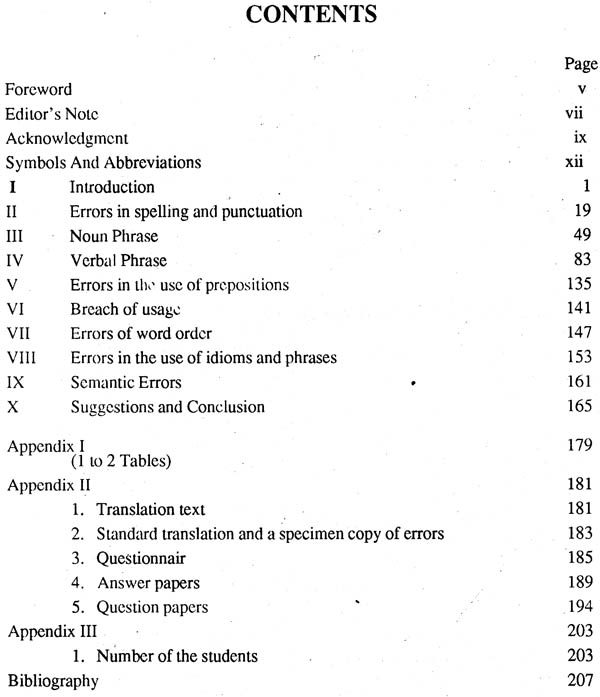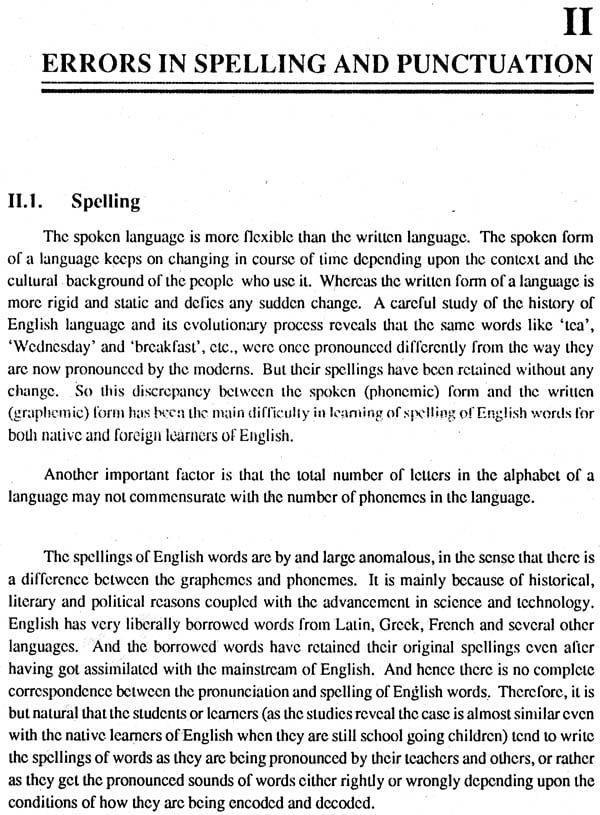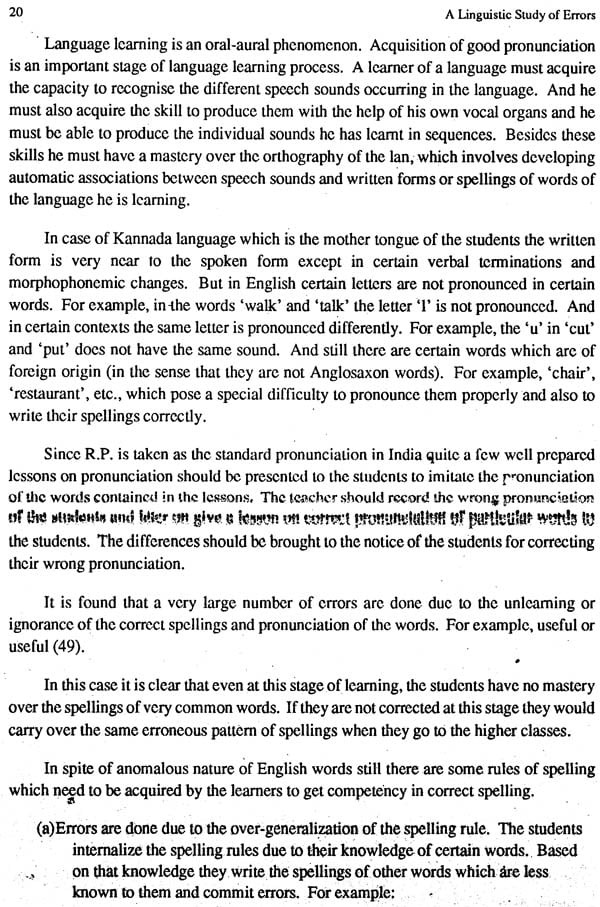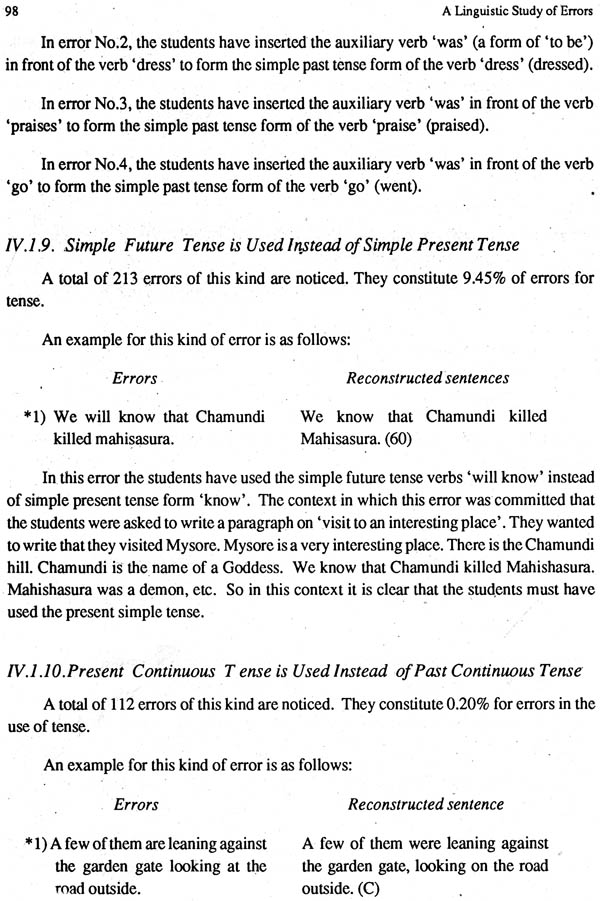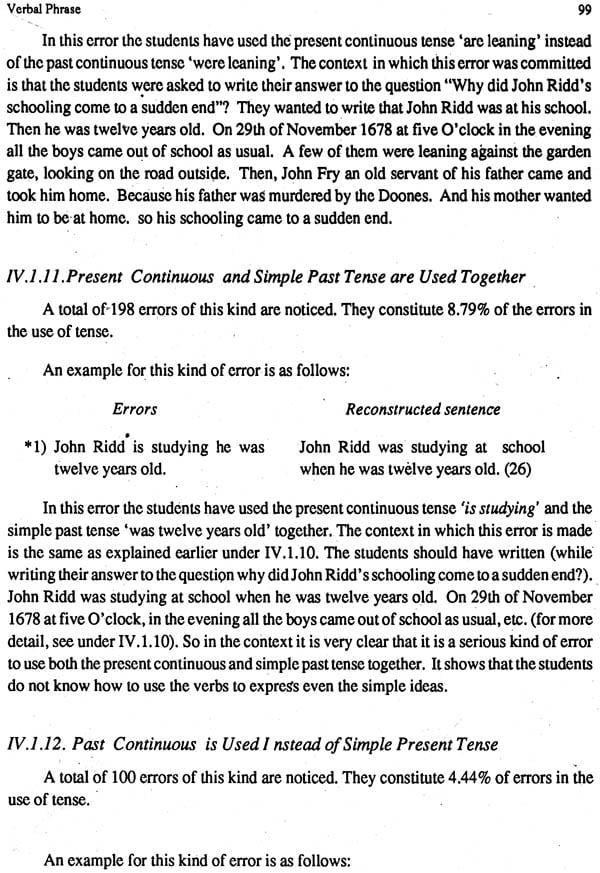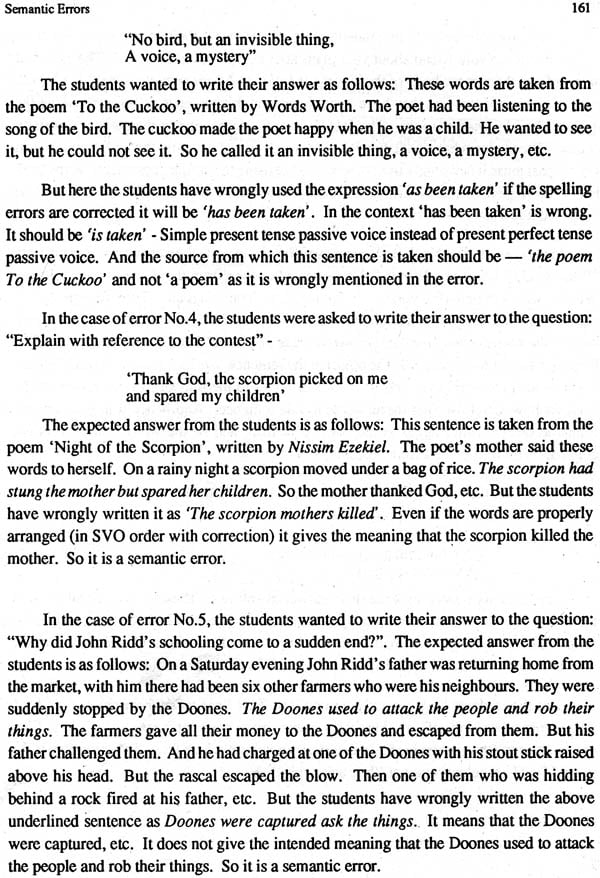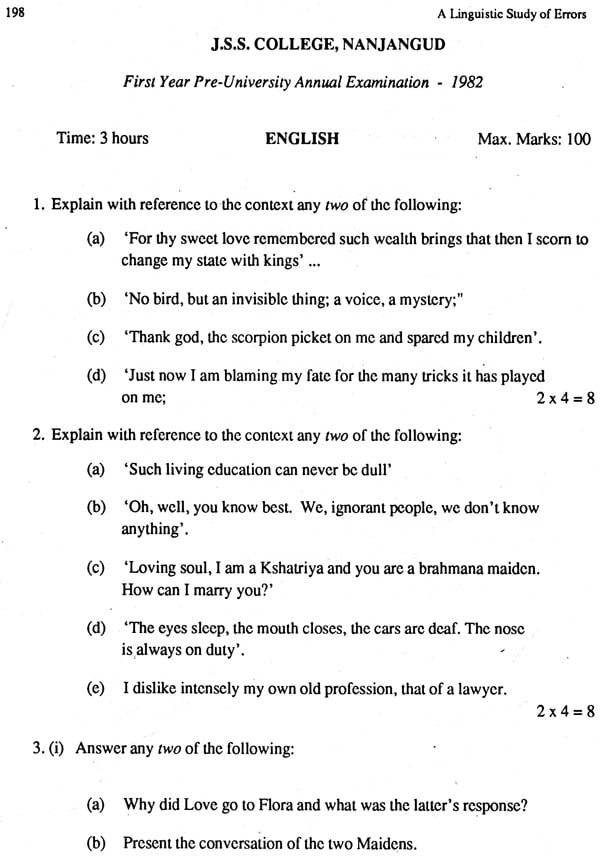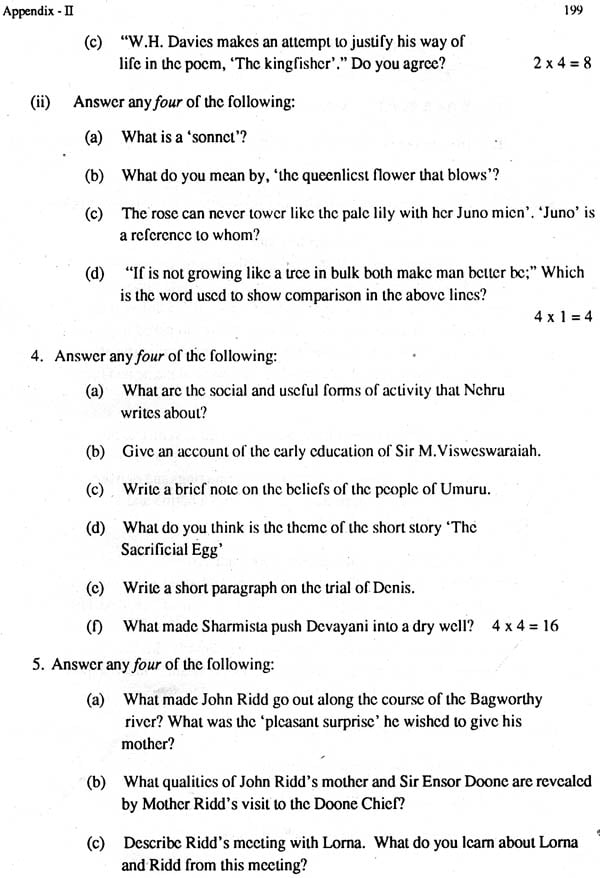
A Linguistic Study of Errors (In the Written English of the PUC Students With Kannada Mothertongue)
Book Specification
| Item Code: | NAW156 |
| Author: | R. Nanjaiah |
| Publisher: | Central Institute Of Indian Languages, Mysore |
| Language: | English |
| Edition: | 1994 |
| ISBN: | 8173420025 |
| Pages: | 224 |
| Cover: | PAPERBACK |
| Other Details | 9.00 X 7.00 inch |
| Weight | 360 gm |
Book Description
The Central Institute of Indian Languages has reached 25 years of age and it is a time for reflection about its origin, development, achievements and shortfalls.
The study of Indian language with the objective of preparing them for the new roles of national reconstruction and development was the concern of many from the independence of the country. The major responsibility to support such a study was to be taken up by the State. The Kher Commission of the Government of India recommended the establishment of three Central Institutes for this purpose. The Official Language Resolution of 1968 made the Central Government also responsible for the development of all Indian languages in addition to Hindi. These and other developments led to the establishment of Central Institute of Indian Languages (CIIL) in Mysore on July 17, 1969.
The primary objective of the Institute is the development of Indian languages ensuring coordination between the various developmental activities at the governmental and non governmental levels and also by orienting linguistic research for the development of Indian languages. The Institute is also to contribute towards the maintenance of multilingualism of the country through language teaching, and translation and to strengthen the common bond between the Indian languages.
The work of the Institute consists of research, training and production of teaching materials. The results of these activities can be seen in its more than 300 publications and 6879 teachers trained in its Regional Language Centres. The Institute has been able to make an impact in language teaching in schools making it skill based and function oriented. It has brought audio visual and computed technology to aid the teaching of Indian languages. It has helped many tribal languages to be codified, described and used in education. Its research and training programmes in social, physiological and folkloristic aspects of language and culture have introduced new dimensions to research on Indian languages. The International Institutes organised by the Institute in sociolinguistics, semiotics, phonetics and other areas have helped the development of human resource in these areas.
The major problem of the Institute is that it cannot meet all language needs of the whole country. It has to play the role of a catalyst and model setter. The other agencies are to take over the universal implementation of the innovations. This has not taken place to the desired extent.
In the coming years, the Institute plans to consolidate the earlier work and expand the work in the areas of translation, computer applications and production of audio visual materials. It wishes to strike new grounds in language evaluation and storage and dissemination of language information. The Institute will move into anew Campus to carry on the work with new vigour and vision.
One part of the Silver Jubilee Celebration is the publication of 25 special volumes. The present book is one of these volumes.
General Remarks About the Position of English and Its Importance
English is a legacy of the centuries of British colonial rule in India. Lord Macauley made it clear in the British Parliament, before the introduction of English in the Indian Schools and Colleges that the aim of English education was certainly to help the Indians, to enable them to serve in different departments of the British Government in India. But he was aware of the consequences when he said that being educated on the western lines, the Indians would demand western institutions, and one day they would certainly demand freedom from the Britishers, and the Britishers would lose an empire itself. And that would be the greatest day in the British history. His prophecy came true, over a period of years when some Indians received English education, they began to revolt against the British rule in India and demanded freedom from all the shackles which cowed down the Indians for centuries. There was a new wave of political awareness. This movement received a hew momentum when Gandhiji plunged into Indian Politics. Under his leadership, hundreds and thousands of English educated Indians like Nehru and others from all walks of life, like doctors, engineers, lawyers, teachers, joined Congress, and fought for India’s freedom. English became the strongest weapon in the armoury of the educated Indians. Ever since then English has been associated with freedom, new ideas, and scientific temperament. It has been enjoying a very prestigious position in all higher institutions of learning. Benefits arising out of an ability to speak and write good English far outweighs similar accomplishment in any other regional languages. Number of newspapers and magazines published in English in India are always on the increase and overnumbering the books published in any of the Indian languages.
English has been given the position of an official language (along with Hindi) in Indian Constitution. All the proceedings of the Parliament get published in English. It has been a very effective link language between the states and the centre. And it has been the only language of national and international communication.
Indian University Education Commission has also expressed its opinion "English is our only source at present for western culture, knowledge and research, and advancement of higher studies and research, in Indian universities. And they could only be co-ordinated and helped by the retention of English".
Educationists and people who are interested in the future of India are divided into two groups: (i) Those who maintain that English should be continued as the Lingua Franca and the Medium of Instruction and (ii) This group consists of some enthusiasts who argue that English should be replaced by Hindi. And they also believe that otherwise there is no scope for regional languages.
In spite of this controversy English has occupied a key position in our educational programme in India. It is also a medium of instruction at the University stage. English has conducted sparks of inspiration from the world outside to India and from India to the world. We have paid a heavy price in the past for neglecting this privilege. And so it is not wise to throw away the privilege which is already ours. If at all we do away with English then we may have to condemn ourselves like Othello: "Of one whose hand
Like the base Indian, threw a pearl away
Richer than all his tribe"
Although English is not richer than all our tribe, but it is a pearl all the same. So in future it is good to retain English at least as an important second language, so that we may keep open the only window of the knowledge and culture of the larger world.
1.2.(i) The Present Situation of Teaching English in the Schools and Colleges of Karnataka
Conditions of teaching English in the colleges are full of problems and far from satisfactory. A teacher in a P.U.C. class, is forced to pre-suppose that he is going to teach the homogeneous elements. But in reality there is diversification. The students do not have the same standard as far as their knowledge of English is concerned. Among other things, one important reason for this phenomenon is that all of them might not have studied have the same standard as far as their knowledge of English is concerned. Among other things, one important reason for this phenomenon is that all of them might not have studied English from the beginning of their school education. Because only the children of the educated and well-to-do people are usually sent to English schools (two years of pre- primary school, four years of primary school), where all the subjects are taught to them in English only. And they continue their (upper primary education) Middle school education in the same pattern (all the subjects are taught to them in English only, except the first language which is any one of the regional languages, generally the mother tongue of the children). Obviously these students are exposed to the proper atmosphere, congenial to pick up English at a very early stage of their education. The home atmosphere also contributes very significantly in helping them to learn English. So, they are what one may call linguistically advantageous students to learn English more or less in a natural way. At this stage of their learning of the second language, the parents, teachers and relatives show them a kind of sympathetic consideration, when, they commit errors and help them to correct them without any kind of punishment or bitter reaction.
The disadvantaged students, the children of the poor and uneducated people who are more in number than the advantaged students begin to study English as a second language only when they come to V standard and all other subjects are taught to them in their mother tongue. For such students English is taught as a subject and it continues to be a subject. It hardly ever becomes the medium (here, in Karnataka the subjects are taught in Kannada). So, there is no proper communication between the English teacher and the disadvantaged | students. And most of these students do not have any opportunity of using or hearing English either at their homes or at schools except in their English class. So, a difference between the two kinds of students (the students coming from a Convent School and the students coming from a Government Primary School) is very conspicuous. And it continues when they come to their High School (from VIII standard to X standard). Here also the difference in their skills of the English language is not narrowed down.
But when they come to the P.U.C. this difference may undergo some change because of college atmosphere. The students will have some access to English newspapers and magazines, etc. And they are exposed to the atmosphere where they notice their teachers, sometimes their senior students or their own classmates who have come from-some English medium schools and others speaking English. The announcement on the notice boards will also have some influence on their rate of learning the language. But, it is very likely that they may also encounter bad English on the notice boards, etc., in their college(s). Many a time the teacher himself may not be competent enough to diagnose the errors of the students and offer his suggestions to help them to correct their errors. The reasons being that the training he received at a Teachers’ Training College or B.Ed. College is not obviously an adequate one.
**Contents and Sample Pages**
